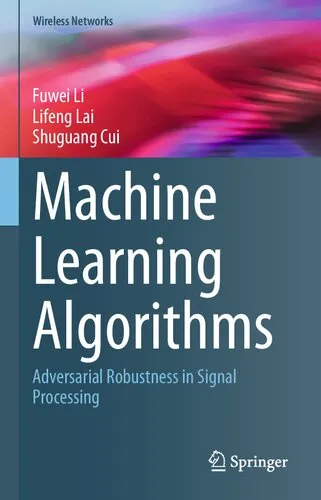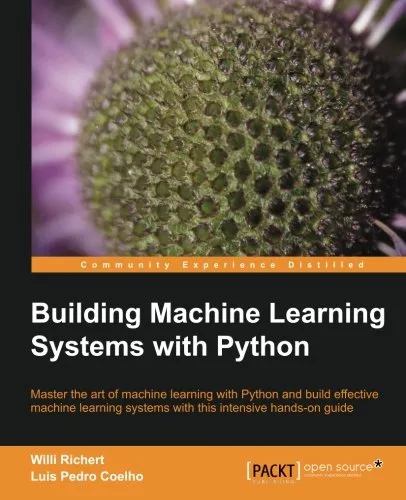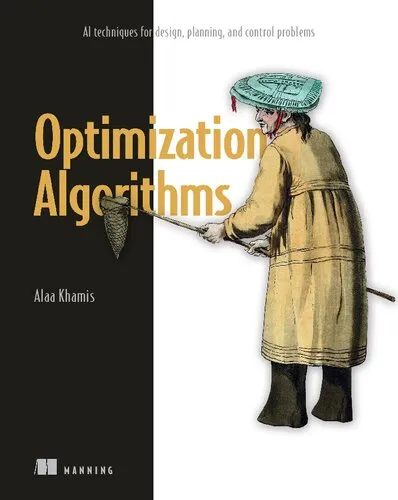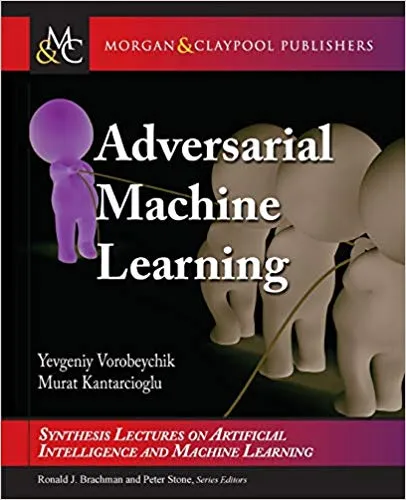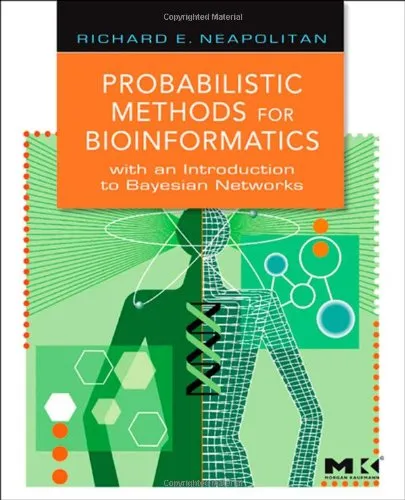Machine Learning Algorithms: Adversarial Robustness in Signal Processing
4.0
Reviews from our users

You Can Ask your questions from this book's AI after Login
Each download or ask from book AI costs 2 points. To earn more free points, please visit the Points Guide Page and complete some valuable actions.Related Refrences:
Introduction to "Machine Learning Algorithms: Adversarial Robustness in Signal Processing"
Machine learning has revolutionized how we approach problem-solving in a wide range of fields, including signal processing. However, as powerful as these algorithms are, they remain vulnerable to adversarial attacks. "Machine Learning Algorithms: Adversarial Robustness in Signal Processing" explores the cutting-edge intersection of machine learning, adversarial robustness, and signal processing in an accessible and methodical way.
Authored by Fuwei Li, Lifeng Lai, and Shuguang Cui, this book serves as a crucial guide for researchers, practitioners, and students concerned with developing resilient machine learning systems that align with real-world challenges in signal processing applications. In an era where adversarial attacks threaten the integrity and reliability of intelligent systems, this book provides both theoretical foundations and practical insights into defending against such vulnerabilities.
Detailed Summary of the Book
The book is divided into meticulously crafted sections that take a comprehensive approach to equipping readers with the tools and knowledge necessary for building robust machine learning models in the context of signal processing.
The initial chapters lay the groundwork by introducing the fundamentals of both machine learning and signal processing. These serve as a primer for readers of varying expertise. The authors discuss the popular supervised and unsupervised learning algorithms, including neural networks, support vector machines, and clustering models, as they pertain to processing and interpreting signals.
Subsequent chapters delve into the key topic of adversarial robustness. The authors present the nature, scope, and mechanisms of adversarial attacks, alongside techniques that empower practitioners to detect and mitigate these risks. By analyzing adversarial examples in the context of signal processing, the book demonstrates how malicious entities can manipulate algorithms to produce inaccurate results. Techniques such as adversarial training, model regularization, and advanced defense mechanisms are explained in great detail, supported by real-world case studies.
The book also juxtaposes the theoretical aspects with practical implementations, offering coding exercises and pseudocode to enhance the learning process. These practical outputs empower readers to translate concepts into concrete action, ensuring better adaptability to real-world signal processing challenges.
Key Takeaways
- A comprehensive understanding of machine learning algorithms used in processing audio, image, and other signal modalities.
- Deep insight into adversarial vulnerabilities and the impact of attacks on machine learning models.
- Practical solutions and defense mechanisms to build robust and reliable intelligent systems.
- Guidance on applying both classic and modern machine learning methods for secure signal processing applications.
- Real-world applications and case studies illustrating adversarial robustness in action.
Famous Quotes from the Book
"Adversarial robustness is not an option but a necessity; the integrity of intelligent systems hinges on the ability to anticipate and defend against malicious manipulations."
"Signal processing is the canvas upon which machine learning paints, but without robustness, even the most beautiful picture is vulnerable to distortion."
"To build truly intelligent systems, machines must not only emulate human cognition but also withstand human ingenuity aimed at deception."
Why This Book Matters
In an age defined by increasing dependence on machine learning for critical tasks, adversarial attacks have emerged as a considerable threat to the security and trustworthiness of intelligent systems. "Machine Learning Algorithms: Adversarial Robustness in Signal Processing" addresses this issue with a unique focus on signal processing, making it an invaluable addition to the libraries of data scientists, engineers, and security researchers.
The authors combine rigorous academic research with practical know-how, ensuring the book is both intellectually enriching and actionable. By emphasizing adversarial robustness, the book responds to a growing need for secure, resilient solutions in applications ranging from autonomous vehicles and healthcare diagnostics to telecommunications and defense systems.
This book bridges the divide between machine learning and signal processing communities, fostering new interdisciplinary methodologies for improving adversarial resistance. Its emphasis on both the "how" and "why" of robust machine learning establishes it as a must-read for anyone invested in the future of intelligent systems.
Free Direct Download
You Can Download this book after Login
Accessing books through legal platforms and public libraries not only supports the rights of authors and publishers but also contributes to the sustainability of reading culture. Before downloading, please take a moment to consider these options.
Find this book on other platforms:
WorldCat helps you find books in libraries worldwide.
See ratings, reviews, and discussions on Goodreads.
Find and buy rare or used books on AbeBooks.
1450
بازدید4.0
امتیاز0
نظر98%
رضایتReviews:
4.0
Based on 0 users review
Questions & Answers
Ask questions about this book or help others by answering
No questions yet. Be the first to ask!
